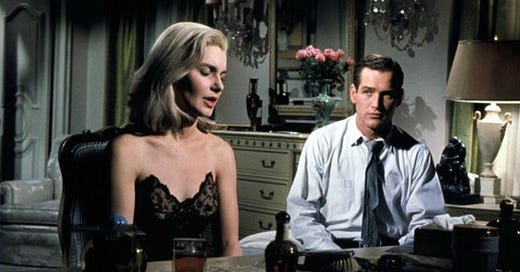From the Terrace (1960)

"From the Terrace" is not particularly well remembered, but it's an interesting example of midcentury melodrama. It addresses the topics of marital infidelity and divorce in a bold way you generally didn't see in that era. It casts a gimlet eye on the accepted practice of putting business ahead of love and family.
And it stars husband-and-wife team Paul Newman and Joanne Woodward in the third of their 10 onscreen appearances together.
Newman plays Alfred Eaton, a young go-getter from a fractured family determined to make his own high place in the world. Woodward plays Mary St. John, the unobtainable daughter of an old-money clan whom he pursues relentlessly and then abandons for his work once they're married.
Though Mary is ostensibly the villain of the piece, it's a much more nuanced portrait of an unraveling marriage, with Alfred bearing an equal share of the responsibility for its descent from joy to neglect to poison. He consciously puts her in a distant second place behind his job, first as co-founder of his own aeronautics company and then as worker drone for a prominent financier.
At first Mary defends Alfred from her friends' taunts about abandoning her. But as time marches on she grows more resentful, insisting that she has a right to socialize while he's away for months at a time — and emotionally absent even when home. Eventually she reignites an affair with Jim Roper (Patrick O'Neal), the dashing doctor to whom she was engaged before Alfred stole her away.
By the end she's a shrewish harpy gleefully throwing her cheating in her husband's face. Her idea of rapprochement is offering an open marriage where they can each sleep with whomever they want. Woodward is icy and effective in the role, a platinum blonde hairdo offsetting her less-than-angelic demeanor.
It's an atypical performance for Newman, who at this stage of his career usually played earnest young men or charming rascals. Here he's a repressed sort, a guy who secretly craves the affection he never got from his parents. It's essentially a portrait of a hero who falls onto the wrong path. He quickly realizes his mistake, but rather than correct it he's determined to carry through no matter what.
He ends up as rather a grim figure, hectored on the job by Old Man MacHardie (Felix Aylmer) and harried at home by Mary. Indeed, the film's middle section can be rather hard to get through, and at just shy of 2½ hours the movie is much longer than it needs to be. It was written and directed by Mark Robson ("Champion," "The Inn of the Sixth Happiness"), based on the novel by John O'Hara.
Some of the best stuff is at the beginning, when Alfred returns home from World War II. His father is a nouveau riche owner of a Pennsylvania steel mill. Terrifically played by Leon Ames, Samuel Eaton is an old-school tyrant who emotionally checked out of the family a dozen years earlier when his older son died of cystic fibrosis. The great Myrna Loy plays the mother, who's turned to drink and the arms of another man for comfort. One of her favorite habits is to board a train to anywhere and drink herself into a stupor.
Expecting a hero's welcome, Alfred returns to a lost mother and a father who's openly hostile to his presence. He rejects dad's assumption that he'll follow into the family business, instead opting to establish a private plane manufacturing company with Lex Porter, an old-money pal (a superbly WASP-y George Grizzard).
Samuel tries to warn his son that unless he puts up half the seed money himself, Alfred will always be treated as the lesser partner — a prediction that turns out exactly so. It's his way of offering the dough himself, but there's too much pride and resentment between them for the message to get through. The elder Eaton is too used to keeping the younger in his place.
"You're not big enough to even walk in my shadow. And you never will be!" he thunders.
Perhaps the film's most pivotal scene takes place when father Eaton tries to explain to Alfred why he's been so uncaring toward him. It's a soul in pain reaching out, trying to make amends. But he loses himself in a quagmire of regret over his lost boy, which Alfred interprets as another brick in the wall of shunning him. Dad suffers a heart attack and dies soon after.
Of course, the lesson is that Alfred's father only cared about wealth and status, and it brought him to a low end. But the son can't see it, and like so many sons with chips on their shoulders, unwittingly starts down the same path himself.
The film picks up again in the third act with the introduction of the character of Natalie Benzinger, the daughter of a mine owner who comes to represent for Alfred all the opportunities he eschewed for a life of warmth and family. They begin a tentative affair while he's assessing the mine for purchase by MacHardie.
At first Natalie rejects his overtures because he's married, but comes to recognize the streak of nobility and empathy under Alfred's hard, crusty exterior. She's played by Ina Balin, who received a Golden Globe nomination for her resonant performance.
There are too many twists and turns of the plot in "From the Terrace" — including the machinations of MacHardie's son-in-law, Creighton Duffy (Howard Caine), whose business affairs are tied up with Alfred's old buddy Lex. He tries to blackmail Alfred with evidence of his affair with Natalie.
It's a classic example of filmmakers adapting a novel and failing to pare down the characters and narrative to the beating heart of the tale. But there's still a vibrant pulse in this film, an odd mix of dourness and elation that subtly encourages us to seek our own bliss.



